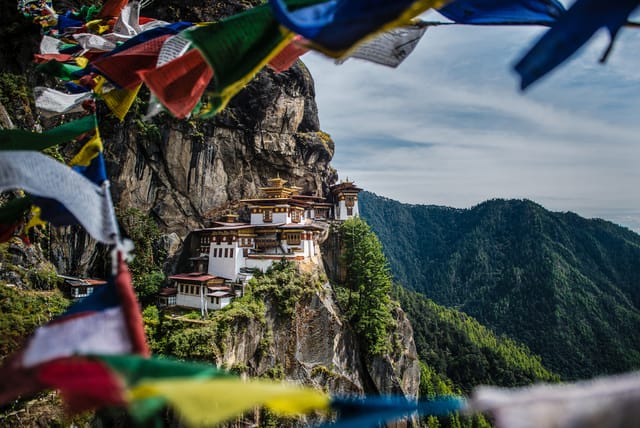The Kingdom of Bhutan is a small, landlocked country in the Eastern Himalayas. It borders India to the south and China to the north. With a small population of fewer than 1 million people, Bhutan isn’t top of everyone’s travel list. A Bhutan holiday is well worth it in order to experience fantastic trekking opportunities, lush green forests, and a wealth of cultural attractions. The most famous of these is the iconic Tiger’s Nest Monastery, which hugs a clifftop in the Paro Valley. A Bhutan holiday can easily be incorporated into an Indian adventure or a trip to explore the Himalayan valleys of Nepal. An unusual and fascinating destination, here are 5 things you definitely didn’t know about Bhutan. “The Land of the Thunder Dragon.”
Bhutan Measures its Gross National Happiness

Since 1972, Bhutan has measured its socio-economic success using Gross National Happiness (GNH), rather than the more commonly used Gross Domestic Product (GDP). This gives more traction to non-economic factors such as health and environmental sustainability than GDP, which focuses purely on economic growth. Bhutan uses its GNH to form and implement policy. In fact, no law can be implemented in the country without first being screened to ensure that it will not have a negative impact on the health and wellbeing of any group in the country. The idea has proved so popular that the United Nations has now adopted the GNH model to measure the happiness of people in different countries around the world.
Bhutan one of World’s Leading Environmentalist Countries

Some countries have taken a lead in environmental policy. Costa Rica is a good example. Bhutan is another. In fact, Bhutan is the only carbon-negative country in the entire world. Meaning that it removes more greenhouse gases from the atmosphere than it emits. This is largely down to the country’s well-preserved forests. More than 70% of Bhutan’s land is forested, hiding a wealth of biodiversity including tigers, bears, elephants, snow leopards, red pandas, and the endemic Bhutan takin. The government carefully manages its natural resources. Many of these species are protected in national parks and reserves, also acting as a huge carbon sink for the country. Subsequently, it is written in Bhutan’s constitution that at least 60% of the country’s land area must be forested. So don’t expect things to change in the country anytime soon. Good news for the environment!
There are No Traffic Lights in Bhutan

Because of its remote, mountainous location, Bhutan’s roads are quiet and underused. Therefore, there was never any real need for traffic lights. In the urban centers and the capital city, Thimphu, white-gloved traffic police direct the traffic at intersections. When the Bhutan government tried to introduce a single traffic light in the capital, it was only in operation for 24 hours. There was such a public outcry that the authorities actually reversed their decision. Today the traffic officers still work in the city and are a unique highlight to visitors when enjoying a trip to Bhutan.
Bhutan Home to Highest Unclimbed Mountain in the World

Lying on the Chinese border, Gangkhar Puensum is 7,570 meters tall. Meaning it is the 40th highest peak in the world. This should make it an attractive option for mountaineers and trekkers the world over. In the 1980s, several teams from Britain and Austria tried to scale the peak. However, all of the missions failed due to bad weather or illness. Eventually, in 1994 the Bhutanese government actually banned the climbing of any mountain over 6,000 meters high. This was done out of a respect for a common Bhutanese belief that towering mountains are the home of spirits who should not be disturbed. The Chinese government, out of respect for its Bhutanese neighbor, also banned climbing missions on its side of the mountain. Because of this, it remains true that Gangkhar Puensum has never been successfully scaled by human beings.
Bhutan Banned TV and Internet until 1999

Bhutan has long lagged behind its developing neighbors, particularly the powerhouses of India and China, which swamp Bhutan geographically. In fact, it didn’t even have electricity until the 1970s, and television or the internet until the late 1990s. This was a deliberate attempt by the authorities to preserve traditional Bhutanese traditions and culture, which still survive today and can be witnessed on any Bhutan holiday. However, the government did eventually give in to the modern technology that we all rely on so much today.
Bhutan Holiday Recap
A trip to Bhutan will be rewarded with incredible landscapes, ornate Buddhist temples, and stunning wildlife. Plus some of the friendliest people you will find anywhere in the world. It is a highly unusual country and one that should make it onto every intrepid travelers’ bucket list. Thank you for making Skycap News™ your source for travel tips for your next holiday trip.
